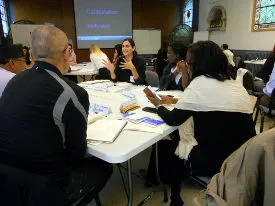Including all people in constitution-building: International IDEA co-organizes training on constitution-building for civil society

Recent events in North Africa, commonly referred to as the Arab Spring, have led to an increased focus on the importance of constitution building as a participatory activity. The process of how constitutions are designed and implemented is changing and this shift allows for more opportunities for civil society to be involved and take on a greater role than in the past.
In support of this participatory approach, International IDEA and its collaborators, Democratic Reporting International, Interpeace, United States Institute of Peace, United Nations Department for Political Affairs and the Barcelona International Peace Resource Center are holding a five-day training. The involvement of civil society organizations and citizen awareness is critical to strengthening the values of accountability, representation, and inclusiveness.
“The Nobel Committee has just recognized the important role civil society can play in peaceful democratic constitutional transitions,” said Sumit Bisarya, head of the constitution building programme at International IDEA. “We are holding a training in Barcelona to build a network of civil society actors involved in constitution building, so that Tunisians, Ukrainians, Sri Lankans, Chileans and others from a total of 20 countries can share knowledge, tools and experiences in how to encourage consensus-based inclusive democratic transitions.”
From 12-16 October in Barcelona, the organizers will be guiding and learning from 23 participants in how civil society organizations can be an active and effective part of constitution building and further involve people who may wish to be more involved in influencing the process. The training participants, selected from more than 300 applications, are working in institutes and organizations all over the world including Nepal, Somalia, Zimbabwe, Libya, Thailand, Tunisia, Ukraine, Myanmar, Tanzania, Sri Lanka, Sudan, Chile, Philippines, Liberia, Vietnam and Sierra Leone. These professionals are coming from countries in different phases of constitution building and sharing of perspectives about what is happening in their countries.
Brief introductions revealed both the common and different motivations of the participants. One participant from Tunisia highlighted the need for accountability in the implementation process of the constitution, while another participant mentioned the importance of the involvement of youth and elections training in Myanmar.
This dialogue is more than an exchange of ideas but an opportunity for potential solutions or new approaches in how to better involve the people. Bisarya said learning is the role of the organizers too. This event will contribute to the development of a manual to be distributed next year.



